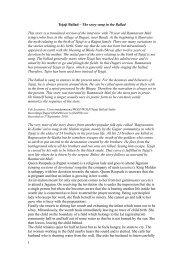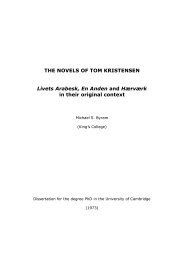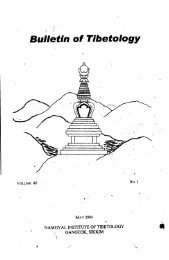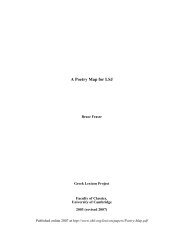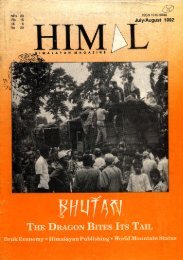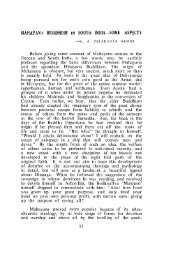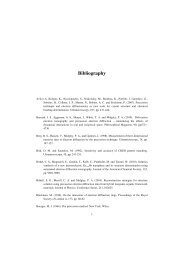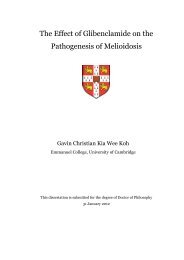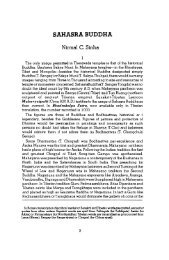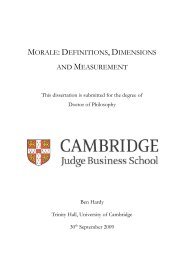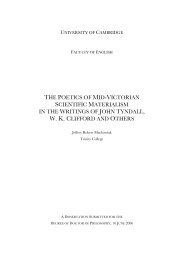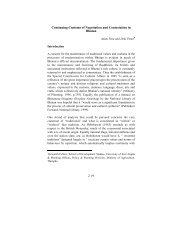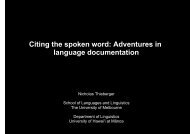The Crusades, the Genoese and the Latin East - DSpace at ...
The Crusades, the Genoese and the Latin East - DSpace at ...
The Crusades, the Genoese and the Latin East - DSpace at ...
Create successful ePaper yourself
Turn your PDF publications into a flip-book with our unique Google optimized e-Paper software.
Jerusalem were. In many ways Bohemond's charter reflects <strong>the</strong> confusion st<strong>at</strong>e of <strong>the</strong> principality<br />
of Antioch <strong>at</strong> <strong>the</strong> time <strong>and</strong> <strong>the</strong> general lack of order in <strong>the</strong> management of <strong>the</strong> <strong>Genoese</strong><br />
community from <strong>the</strong> fall of <strong>the</strong> first kingdom to <strong>the</strong> appointment of Guido Spinola as consul.<br />
An important change occurred <strong>at</strong> <strong>the</strong> end of 1189. Guido Spinola arrived in <strong>the</strong> kingdom<br />
of Jerusalem in <strong>the</strong> l<strong>at</strong>ter part of 1189 as part of <strong>the</strong> large <strong>Genoese</strong> crusading mission. fie was a<br />
consul of <strong>the</strong> commune when he left Genoa which made him <strong>the</strong> most important person in <strong>the</strong><br />
fleet. Guido Spinola is first <strong>Genoese</strong> mentioned in <strong>the</strong> annals' list of <strong>the</strong> <strong>Genoese</strong> leaders of <strong>the</strong><br />
crusade.<br />
533 In <strong>the</strong> kingdom of Jerusalem Guido quickly won <strong>the</strong> personal respect of many people.<br />
<strong>The</strong> <strong>Genoese</strong> annals <strong>and</strong> o<strong>the</strong>r contemporary sources praise Guido's activities, even charters<br />
mention his fighting spirit in <strong>the</strong> b<strong>at</strong>tlefield. Moreover, with <strong>the</strong> arrival of Guido Spinola in Tyre a<br />
new era began in <strong>the</strong> rel<strong>at</strong>ionship between Genoa <strong>and</strong> <strong>the</strong> kingdom of Jerusalem. Guido arrived as<br />
a leader of <strong>the</strong> <strong>Genoese</strong> contingent <strong>and</strong> may have been appointed in Genoa also to <strong>the</strong> position of<br />
<strong>Genoese</strong> consul in <strong>the</strong> kingdom of Jerusalem.<br />
Guido Spinola was followed by Maurino Rodoano. <strong>The</strong>se two consul<strong>at</strong>es from <strong>the</strong><br />
autumn of 1189 to <strong>the</strong> autumn of 1191 are interesting because <strong>the</strong> appointed consuls were<br />
dominant persons who shared some similarities between <strong>the</strong>m. <strong>The</strong>y were both in charge when<br />
<strong>the</strong> Third Crusade was <strong>at</strong> its height <strong>and</strong> it is significant th<strong>at</strong> both embarked from Genoa as leaders<br />
of <strong>the</strong>ir fellow crusaders <strong>and</strong> as acting consuls of <strong>the</strong> commune of Genoa. Guido was consul in<br />
1189 <strong>and</strong> Maurino, who was previously consul in 1186, left Genoa as an acting consul of <strong>the</strong><br />
commune in 1190. Shortly before Maurino left Genoa he took part in <strong>the</strong> negoti<strong>at</strong>ions <strong>and</strong><br />
conclusion of <strong>the</strong> agreement with King Philip Augustus regarding <strong>the</strong> modified plans for <strong>the</strong><br />
Third Crusade. <strong>The</strong> consul<strong>at</strong>es of Guido <strong>and</strong> Maurino are interesting also because <strong>the</strong> two consuls<br />
achieved a lot in <strong>the</strong> short period of <strong>the</strong>ir consul<strong>at</strong>es in <strong>the</strong> <strong>L<strong>at</strong>in</strong> <strong>East</strong>. <strong>The</strong>ir activities reflected<br />
Genoa's foreign policy in <strong>the</strong> <strong>L<strong>at</strong>in</strong> <strong>East</strong>.<br />
When Guido Spinola arrived in Tyre, he had to manoeuvre in a delic<strong>at</strong>e situ<strong>at</strong>ion between<br />
various powers. <strong>The</strong> de<strong>at</strong>h of many of <strong>the</strong> leaders in <strong>the</strong> east <strong>and</strong> <strong>the</strong> arrival of forces from <strong>the</strong><br />
west caused much tension in <strong>the</strong> <strong>L<strong>at</strong>in</strong> <strong>East</strong>, especially since <strong>the</strong> leadership of Guy of Lusignan<br />
had already proved to be unreliable. <strong>The</strong> most delic<strong>at</strong>e diplom<strong>at</strong>ic decision to be made was which<br />
of <strong>the</strong> claimants to <strong>the</strong> crown of Jerusalem to support, King Guy who was unpopular <strong>and</strong> defe<strong>at</strong>ed<br />
yet <strong>the</strong> legitim<strong>at</strong>e king of Jerusalem, or Conrad of Montferr<strong>at</strong>, a hero <strong>and</strong> <strong>the</strong> saviour of Tyre.<br />
David Jacoby discussed<br />
<strong>the</strong> complexity of this diplom<strong>at</strong>ic decision:<br />
<strong>The</strong> fierce power struggle between <strong>the</strong> two men was stimul<strong>at</strong>ed by <strong>the</strong> deep cleavage<br />
existing within <strong>the</strong> higher nobility of <strong>the</strong> kingdom, which perpetu<strong>at</strong>ed <strong>the</strong> party quarrels<br />
th<strong>at</strong> had taken place before H<strong>at</strong>tin <strong>and</strong> had been fur<strong>the</strong>r exacerb<strong>at</strong>ed by <strong>the</strong> defe<strong>at</strong> of July<br />
1187... <strong>The</strong> two cities [Pisa <strong>and</strong> Genoa] took sides in this conflict, to <strong>the</strong> best of <strong>the</strong>ir own<br />
533<br />
Ann. Ian., vol. 2, pp. 32-33<br />
153



